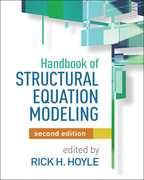Handbook of Structural Equation Modeling
Second Edition
Edited by Rick H. Hoyle
Hardcovere-bookprint + e-book
Hardcover
orderFebruary 17, 2023
ISBN 9781462544646
Price: $130.00785 Pages
Size: 7⅜" x 9¼"
“The breadth of topics covered in this reference text leaves little doubt that a firm grasp of data analysis with latent variables is essential to the advancement of scholarship in the social and behavioral sciences....An excellent resource for the many conceptual and analytical problems frequently encountered by researchers making use of SEM….Readers will find themselves returning to the Handbook again and again as a starting point for their work on virtually any topic currently within the broad reach of SEM.”

—Structural Equation Modeling (on the first edition)
“A tremendous resource that will be of great value to researchers and students who study SEM and apply it in their research. SEM statistical models and methods have continued to be developed over the past decade; the second edition of this volume incorporates these developments along with coverage of new estimation algorithms, computer programs, and empirical applications. The Handbookcould be used in graduate courses—students could be introduced to its basic chapters for contemporary articulations of SEM models and methods, and to subsequent chapters for specialized models and applications.”

—Kenneth C. Land, PhD, John Franklin Crowell Professor Emeritus of Sociology and Demography and Research Professor, Social Science Research Institute, Duke University
“The world of SEM—in terms of both applications and methodological advances—has expanded dramatically in recent years. Just learning SEM in the first place can be hard enough, let alone keeping up with all of the new developments. The second edition of this handbook is an invaluable resource for anyone seeking a comprehensive summary of current possibilities and best practices using SEM. The authors are all leading experts who have tackled an exhaustive list of topics, with an eye toward accessibility for new learners, but without shying away from the material’s inherent complexity.”

—Lesa Hoffman, PhD, Department of Psychological and Quantitative Foundations, College of Education, University of Iowa
“SEM provides unity to disparate analyses and facilitates model evaluation and modification in the everyday practice of uncountable researchers. This is an impressive, 'must-read' book for practitioners of SEM and those who want to apprehend the strength and usefulness of the SEM idea.”

—Albert Satorra, PhD, Emeritus Professor of Statistics, Universitat Pompeu Fabra, Barcelona, Spain
“This handbook is an outstanding desk reference on a wide variety of advanced and foundational topics. I recommend it either for personal use or for a class with students with strong quantitative backgrounds. The second edition has excellent coverage of exciting developments regarding analysis of longitudinal data. The chapter authors are a 'who's who' of the field.”

—Jeffrey S. Simons, PhD, Department of Psychology, University of South Dakota
“I have always recommended this book for anyone interested in conducting or teaching SEM. The second edition continues to be my favorite comprehensive SEM reference book, with new chapters covering advanced topics.”

—Dana Joseph, PhD, College of Business Administration, University of Central Florida
—Structural Equation Modeling (on the first edition)
“A tremendous resource that will be of great value to researchers and students who study SEM and apply it in their research. SEM statistical models and methods have continued to be developed over the past decade; the second edition of this volume incorporates these developments along with coverage of new estimation algorithms, computer programs, and empirical applications. The Handbookcould be used in graduate courses—students could be introduced to its basic chapters for contemporary articulations of SEM models and methods, and to subsequent chapters for specialized models and applications.”
—Kenneth C. Land, PhD, John Franklin Crowell Professor Emeritus of Sociology and Demography and Research Professor, Social Science Research Institute, Duke University
“The world of SEM—in terms of both applications and methodological advances—has expanded dramatically in recent years. Just learning SEM in the first place can be hard enough, let alone keeping up with all of the new developments. The second edition of this handbook is an invaluable resource for anyone seeking a comprehensive summary of current possibilities and best practices using SEM. The authors are all leading experts who have tackled an exhaustive list of topics, with an eye toward accessibility for new learners, but without shying away from the material’s inherent complexity.”
—Lesa Hoffman, PhD, Department of Psychological and Quantitative Foundations, College of Education, University of Iowa
“SEM provides unity to disparate analyses and facilitates model evaluation and modification in the everyday practice of uncountable researchers. This is an impressive, 'must-read' book for practitioners of SEM and those who want to apprehend the strength and usefulness of the SEM idea.”
—Albert Satorra, PhD, Emeritus Professor of Statistics, Universitat Pompeu Fabra, Barcelona, Spain
“This handbook is an outstanding desk reference on a wide variety of advanced and foundational topics. I recommend it either for personal use or for a class with students with strong quantitative backgrounds. The second edition has excellent coverage of exciting developments regarding analysis of longitudinal data. The chapter authors are a 'who's who' of the field.”
—Jeffrey S. Simons, PhD, Department of Psychology, University of South Dakota
“I have always recommended this book for anyone interested in conducting or teaching SEM. The second edition continues to be my favorite comprehensive SEM reference book, with new chapters covering advanced topics.”
—Dana Joseph, PhD, College of Business Administration, University of Central Florida



